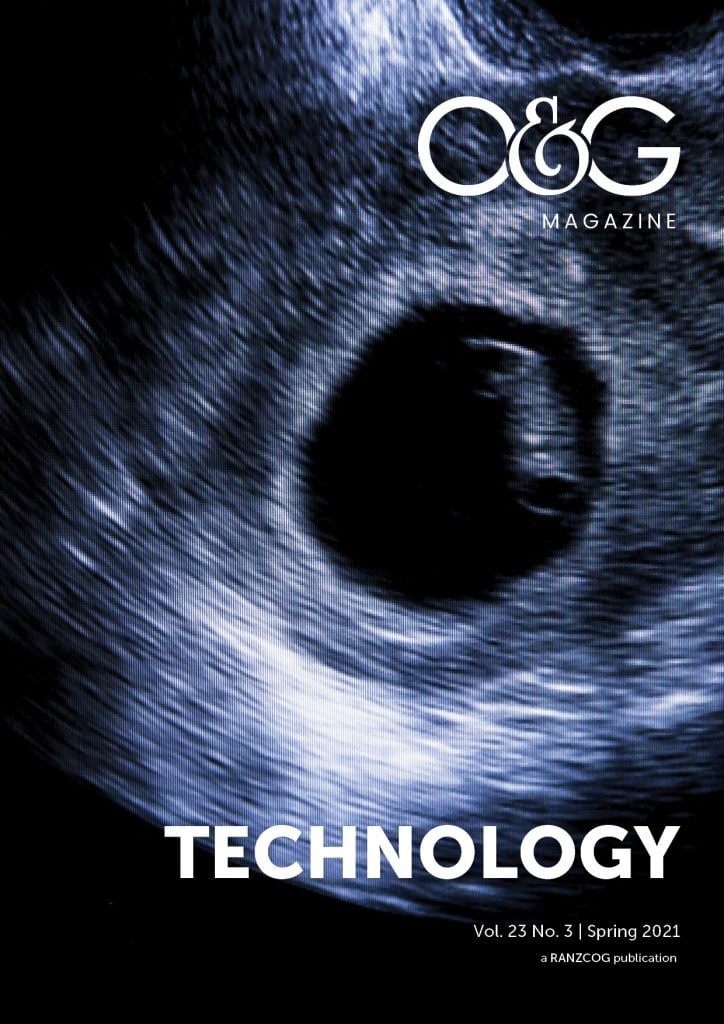The theme for this issue of O&G Magazine is Technology. This topic brings to mind the many books and movies that have predicted technological advances in medicine which, at the time they were written, seemed fanciful or far-fetched. In 1932 Aldous Huxley described, in Brave New World, a future where babies were grown in bottles and then modified (through incremental doses of injected alcohol!) to create a stratified society. I remember watching the 1997 movie Gattaca, then as a final year RANZCOG trainee. It predicted preimplantation diagnosis, the ability to screen out ‘defective’ genes and, once again, a society demarcated into ‘pure’, IVF babies and those who had been conceived naturally, with the potential hereditary risks that entailed. Mary Shelley’s Frankenstein foretold the possibility of organ transplant and in Star Wars, an autonomous humanoid 2-1B surgical robot successfully attaches a robotic arm to hero Luke Skywalker.
The authors of the Spring issue share their knowledge, experience and expertise with the application of technology to our speciality. Members of my age group will remember kneeling in a pool of fluid with your eye on the hysteroscope, or neck pain from using the laparoscope in the same way. Younger members couldn’t imagine a time before the routine use of cameras, video monitors and robots. Endometrial resection and rollerball ablation were the default. The Mirena IUCD, arguably the biggest game-changer in gynaecological care after the pill, was only released in the USA in 2001! Technological changes have also paralleled significant social changes with fertility options for single women, same-sex couples, older women and even those who have had a hysterectomy. Stopping the biological clock is now possible with egg-freezing. We now have the ability to screen out multiple gene-defects, choosing the ‘best’ embryo, as Gattaca predicted. Ultrasound, using technology developed in World War II, was first used for medical purposes in 1956. I remember the ultrasound with our first child 30 years ago. It looked like a snowstorm! What can’t we see now?
In Sapiens, Yuval Noah Harari suggests that perhaps medicine is just an algorithm and that human doctors could eventually be replaced by computers and robots. I think that this is a concept that we should embrace rather than feel defensive about. A computer can hold, and retrieve, much more data than an individual ever can. Eventually, a robot that is able to build a car will be able to safely remove an organ. But we’re not there yet. Computers and robots are adjuncts and they supplement the qualities that only we possess. Risk assessment can only be objective to a degree. What matters to each of us is subjective and varies considerably. Critical thinking and ethical considerations are human processes that are constantly evolving and they can’t be outsourced to a machine. Our patients seek kindness and compassion, the touch of a human hand, the warmth of a human smile. Technology will help us to deliver better health outcomes, but doctors, midwives, nurses and allied health practitioners are who a patient seeks. We’re not redundant…yet!
This will be my last President’s message for O&G Magazine. Books and movies may have predicted a pandemic but I certainly didn’t see it coming! After a wonderful first year of meeting members across Australia, Aotearoa New Zealand and the world, I’ve had more screen time than my children! As the term draws to a close, I reflect with gratitude on RANZCOG’s journey through the pandemic, our support of our members, our authority as a medical leader, the extraordinary volunteers, training supervisors and mentors who have strived to improve women’s health and to train the next generation of women’s health doctors. I’m proud of our advocacy. We will always have more to do but we should celebrate our progress in gender equity, inclusiveness, emotional wellbeing, abortion law reform, relationship building with our midwifery colleagues, consumers and multiple other stakeholders. RANZCOG is our College, your College, an organisation to which you belong, where you are valued and which makes a real and genuine difference.
Of course, it wasn’t all beer and skittles. COVID has terribly impacted our work, lives and families. Engagement with the members revealed that not everyone agreed with the decisions that we made, or the direction that we took. That’s the reality of leadership. Assuming no sinister intent, every good intention will have unanticipated, unintended and unrecognised consequences. The more that you try to do/achieve/change, and the bigger your audience, the more likely that one, or more people, will find an error, a point of disagreement, take offence or be negatively impacted. You can choose to do nothing (very tempting!), or you put your best foot forward, listen to the feedback, learn, and keep on trying. To my surprise, while I still struggle with ‘constructive feedback’, I am now able to absorb it with less personal affront. To those who found the College, or me, lacking, thank you for your feedback. It has been heard and it helps to inform the way forward.
Saying thank you seems an inadequate way to express my feelings about the Chairs, Committee members, Councillors and members who have given so much of their time and good will. To Vase Jovanoska, RANZCOG’s CEO, an extraordinary friend, tireless worker and consummate professional, thank you for working with me, for your support and stewardship of our College. Thank you to the most amazing staff. I felt that I was one of you and that we served the membership together. I wish we’d had more time to hang out. I can’t mention names but Bec and Sabrina had to put up with me the most. I can hear them breathing a sigh of relief! Finally, to the RANZCOG Board: John and John, Gill, Judith, Julie, Ian, Ben and Yee. Quite simply, RANZCOG’s success reflects your dedication, commitment, your collaborative and wise approach. Our members will never know quite how much you do but I will never forget. To John Tait, Yee and Ian, the College owes you a debt of gratitude for your long service. RANZCOG remains in very capable hands with incoming President Dr Ben Bopp and a wonderful Board. To Ben, Julie, Judith, Gill, John Regan, Boon, Jared, Nisha and Sue, I wish you every success, many Board dinners together and smooth waters ahead.
Finally (don’t you love it when someone who writes such long essays says that?), I am conscious that the position of President is an honour and, for that honour, I want to thank the membership. I love my profession and I am genuinely connected to my College. I am also deeply connected to our purpose, excellence in women’s health. There were many highlights during the last three years but one very proud moment was to open the RANZCOG Women’s Health Summit in Canberra. I think that my message in the booklet best expresses the way that I feel.
“In 1975, colour television was broadcast for the first time in Australia and Aotearoa New Zealand. We emerged from a monochromatic view of the world and experienced the joy of diversity. Our senses were awoken to the opportunities that present themselves when the full spectrum of light is expressed, fully and uninhibited. Humanity, too, is that broad kaleidoscope of colour and movement, and we are so much richer when every voice is heard, and every person seen, and valued.
My desire is for our nations to be places where women can be who they can be, who they want to be. My aspiration is for our countries to be ones which respect the culture and traditions of First Australians and Māori, countries where women’s safety is guaranteed, where physiological experiences of menstruation, sexual and reproductive health are discussed and normalised and where the health issues that women experience are validated, investigated and treated expertly.
I want Australia and Aotearoa New Zealand to be places where migrant and refugee women feel welcome and enabled to navigate the health system, where all forms of sexual expression are accepted and respected. We can develop, and promote, societies that supports education, healthier lifestyles and sensitive care for people as they grow older. Let’s work together to achieve this. To learn we must listen to the voices of Aboriginal, Torres Strait Islander and Māori people, health professionals, and consumers from all backgrounds. Let’s forsake our silos and work together, collaborating for a greater good. We must always place women at the centre.
We know what the issues are. We’ve talked about them for long enough. The health of women, their safety and their happiness has been neglected. It’s time to redress that. It’s time for women to have a seat at the table, to lead and to participate fully. Women’s voices must be heard. Welcome to the RANZCOG 2021 Women’s Health Summit. This is our opportunity. It’s Time to Act.”
So long, and thanks for all the fish (Douglas Adams, The Hitchhiker’s Guide to the Galaxy).





Leave a Reply